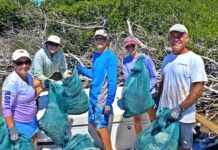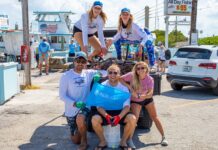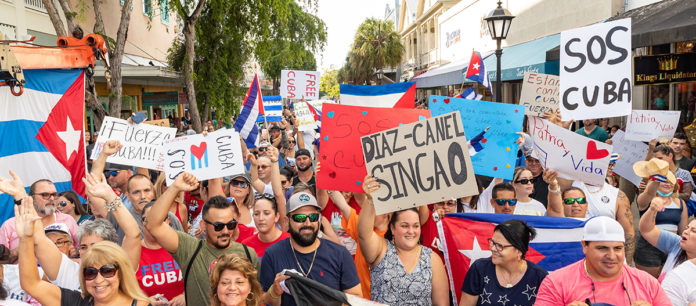
By Sara Matthis, Jim McCarthy and Mandy Miles
On July 11, thousands of protestors in Cuba took to the streets in at least five cities, and were joined by thousands more in South Florida on July 12. This is the largest protest in memory since 1956. The hashtag “#SOSCuba” is trending on Twitter and everyone from Florida Gov. Ron DeSantis to entertainers Gloria Estefan and Pitbull is voicing support for Cuban people.
“Up with liberty. This is the closest we’ve come to liberty in 62 years of dictatorship,” said Robert La Fe, from his cigar shop in Marathon. He said he urges the United States to intercede.
On July 13, peaceful supporters of their brothers and sisters in Cuba gathered in Marathon in front of Juice Paradise Cafe. In Key West, they rallied the night of July 11 at the Southernmost Point, only 90 miles from Havana, then again on Tuesday, July 13 at the historic San Carlos Institute on Duval Street. The institute was founded in 1871 “as the cradle of Cuban independence,” said its board president Rafael Penalver, a South Florida attorney whose family fled the Castro regime just before Penalver’s 10th birthday. “The San Carlos stands as a symbol of the Cuban people’s perseverance in their struggle for independence. In 1892, Jose Marti gave a speech at the San Carlos, calling it La Casa Cuba, where he united the Cuban exile community.”
As of presstime July 14, there were plans in the Upper Keys to gather at Denny’s Latin Cafe and drive south in a car parade.
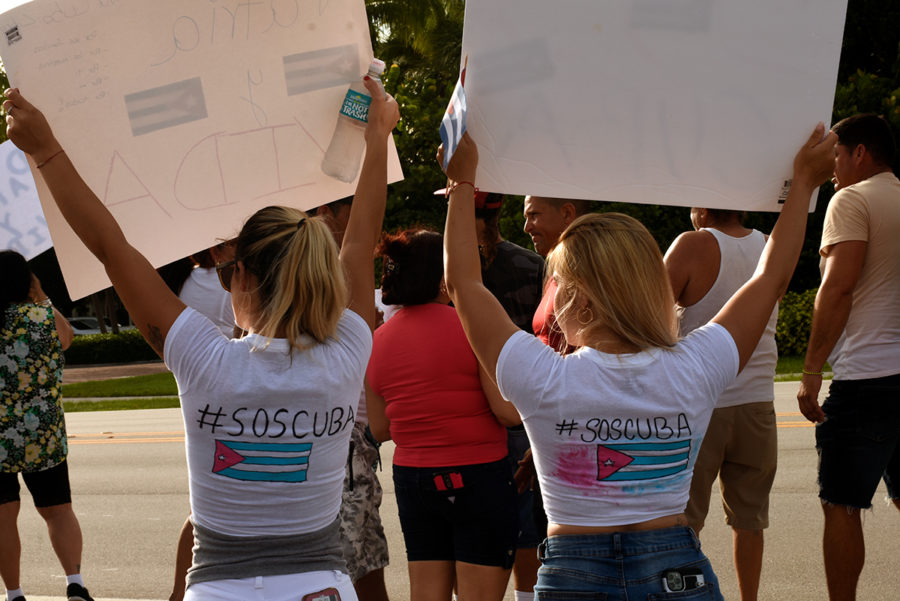
In televised speeches, Cuban President Miguel Diaz-Canel has blamed the recent unrest on the United States. He took office three years ago, hand-picked by former President Raul Castro, brother of Fidel. Diaz-Canel said many of the Cuban protests have been manipulated by social media from the U.S. and called for Communist Party supporters to confront “provocations.”
Locals, many with immediate family members in Cuba, say the situation in the island nation has deteriorated. The pressures of COVID — as an illness rampant in Cuba, as well as the decline it prompted in the Cuban economy that relies on international tourism blocked by the pandemic — have resulted in very reduced medical care and food shortages in Cuba. And, while Cuba used to depend heavily on cheap gas from Venezuela to run utilities, that support has also ended, as that South American country is facing its own economic challenges. That has resulted in regular outages of electricity and water supply that predated the protests.
“There’s no milk for the kids,” said La Fe, who has three grandchildren and one sister living in Cuba, whom he left behind 30 years ago to come to the U.S.
“Florida supports the people of Cuba as they take to the streets against the tyrannical regime in Havana. The Cuban dictatorship has repressed the people of Cuba for decades & is now trying to silence those who have the courage to speak out against its disastrous policies.”
— Florida Governor Ron DeSantis
Alexa Gonzalez, of Key Largo, received a phone call from her second cousin in Havana on the evening of July 12. Gonzalez’s family, which includes her mom, dad, little sister, grandparents, cousins and uncles, said her second cousin is the only family member in Cuba at the moment.
Gonzalez said the phone call lasted two minutes with her second cousin before it was cut off.
“She was freaking out,” Gonzalez said. “She said that they (the police) were throwing everyone onto the streets. They were walking around and they’ll come and attack you. If they find out you’re talking about the U.S., or anything, they’ll come and take your phone and take you to jail.”
Gonzalez also said that kids ages 16 to 19 are being forced to be part of the Cuban military. If they object, “they’re threatening to kill them for being a traitor to the motherland.”
With the call cut off, Gonzalez said she’s hoping to hear from her cousin again, and soon.
“I really hope that she doesn’t die because that’s how things are looking now,” she said.
Cuban American and Florida Lt. Gov. Jeanette Nuñez said the despotic Castro regime in Cuba has deprived its people of economic liberty and life for the past six decades. Nuñez, who’s a frequent visitor to the Keys with a home in Islamorada’s Executive Bay, said the message seen from across the island is an outcry of shortages of basic necessities.
“I stand in solidarity with the freedom-seeking people of Cuba calling for the end of communist dictatorship,” she said in a statement. “The Castros’ continued repression won’t keep the Cuban people from peacefully demanding their God-given rights.”
In Key West, Cuban-American business owner George Fernandez, whose family also fled the Castro regime, said, “It’s difficult to think that Cuba, our sister island, is only 90 miles away, but a world apart in ideology. The recent developments in Cuba are unfortunate in that peaceful demonstrations by the citizens have prompted the government to brutally suppress their voices. My thoughts and prayers are with all my Cuban brothers and sisters at this time, who stand together in their mission to bring their dreams of liberty, democracy and human rights once and for all to our sister island nation.”
Penalver called the protests “a pivotal, grass-roots movement from people crying out for an end to the Castro regime. These are people who have lost their fear. They don’t want aid or physical good, but basic freedoms and basic rights. Unequivocally, the United States should demand an end to the regime. The formula for the continuing Castro regime has been to hold onto power at any cost.






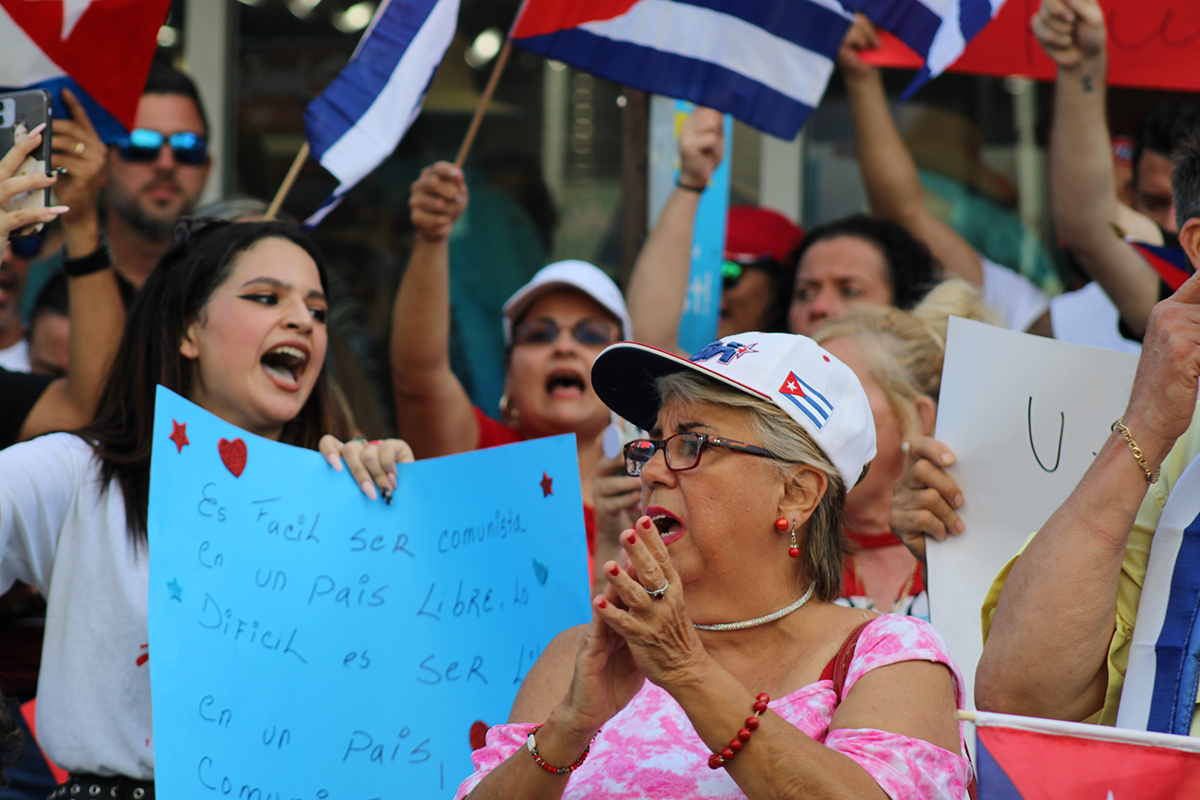


“The shortages we’re hearing about are symptoms of the illness that is the dictatorship and the lack of freedom,” Penalver said, adding that the recent uprising made him fearful for the Cuban people, but “hopeful that the world will finally see their plight.”
“I’ll never forget my classmate’s father, who was tried by the kangaroo courts, and then shot by firing squad,” Penalver said. “When I think of the life I’ve lived in this country, compared to the lives my friends lived in Cuba, there’s just no comparison. There’s just been too much bloodshed and oppression, all so one family could hold onto power.”
“The dark of night is when the regime in Cuba carries out the abduction of leaders of the opposition to the evil socialist dictatorship. But this is a leaderless, grassroots & nationwide movement. The anger has been building up for months & it’s just getting started.”
— U.S. Senator Marco Rubio
Monroe County Sheriff Rick Ramsay told the Keys Weekly that there was an emergency management meeting on July 12 for top law enforcement. Authorities are on alert that the number of chugs trying to cross the Straits, or U.S. residents trying to cross to Cuba on rescue missions, could increase. Ramsay said Homeland Security and the Border Patrol are monitoring the situation. “The crowds in the Keys are large, but peaceful. And they are staying out of the roadways, unlike what happened in Miami on the Palmetto Expressway,” he said, referring to protestors blocking the freeway, expressly forbidden under a law signed by Gov. Ron DeSantis in April, and adding that such actions can sometimes cost the movement support. “Here, in the Keys, they are staying off the roadway. Which we want, for their own safety,” he said.
Stories of what’s happening in Cuba bloomed on July 11, then suddenly disappeared on July 12 from the internet. One Cuban woman working at a grocery store in Marathon said, “They’ve cut the phones, they’ve cut the internet,” referring to Cuban authorities. Ramsay confirmed the situation. “We know that Cuba shut down internet and phones in an effort to suppress what’s really happening,” Ramsay said.
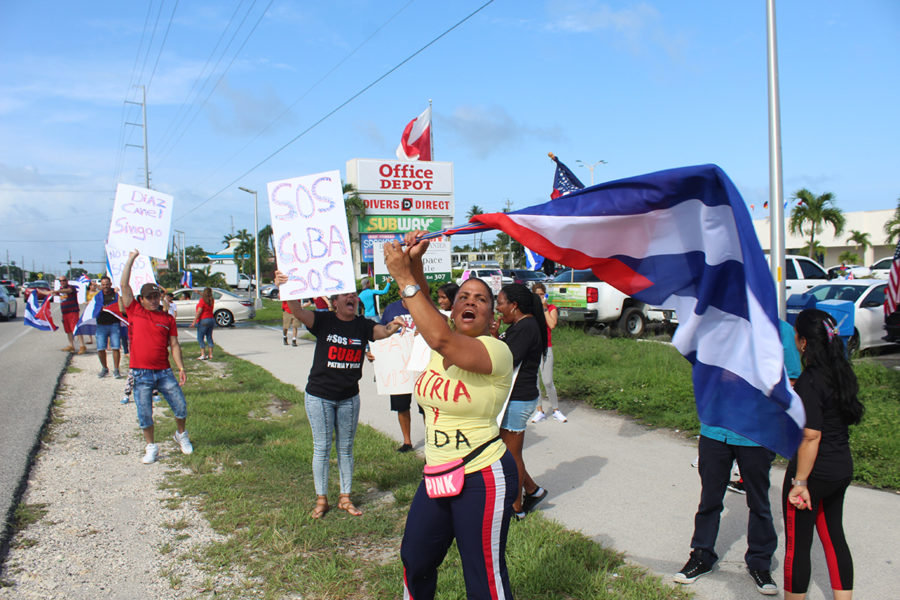
Broadwave’s Jordan Smith said Cuban authorities absolutely have the controls to cut internet access. Broadwave operates in the Florida Keys, offering high-bandwidth Internet access, advanced Wi-Fi capabilities and point-to-point private line services. Smith has visited Cuba and is familiar with the technological landscape.
“It’s 100% done (restricting phone and internet access),” said Smith. “I’ve seen it while I was visiting. They control the internet feed into Cuba and the filtering they do there is insane. They can shut down any sort of access they want — cell phone or WiFi. This is why you can be arrested for using a satellite phone in public. They want to control all forms of communication.”
On July 12, Cuban-Americans in the Keys and U.S. media outlets were reporting that in-country Cubans could no longer access Facebook or WhatsApp. However, as of midday on July 13, there were posts on Twitter that seemed to be recent. Searching #SOSCuba revealed one message that appeared to originate in Cuba asking for support and prayers, while elaborating they were able to get the message out by connecting to a virtual private network (VPN).
Yaimara Perez, also of Marathon, said she spoke to her sister in Cuba two days ago. Normally, she corresponds with her mother six or seven times a day via WhatsApp, but heard nothing on July 12. The following day, again, no communication.
“When I spoke to my sister two days ago she told me her feet were hurting. When I asked why, she told me she has to walk two miles each way to get water for the household. The water utility, the turbines operating them, completely shut down 15 days ago. She needs water for everything, including to brush her teeth,” said Perez, visibly upset.
Sources like the Washington Post and Wall Street Journal have blamed the shutdown of water plants and electric utilities in Cuba on the decreasing supply of cheap gas from Venezuela, a political ally facing its own economic crisis.
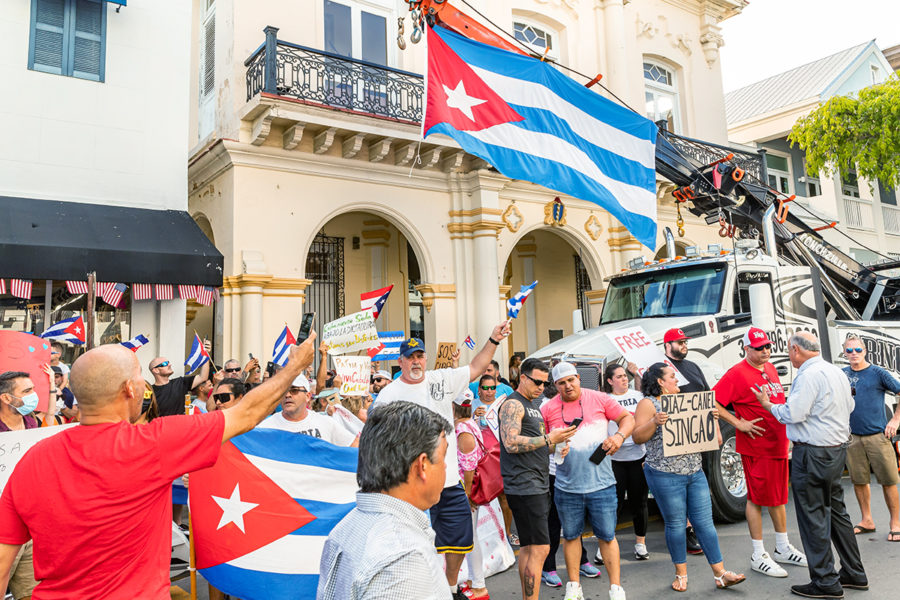
Shortages of food, medicine
The food shortage is perhaps even worse. A local law-enforcement official who interacts with Cuban refugees who are interdicted while trying to reach U.S. shores said, simply, “They’re starving. That’s why they are coming.”
Recently, Acela Valdes spent $400 in U.S. dollars to deliver a 100-pound sack of rice, a 20-pound pork leg and 50 pounds of black beans to family in Cuba through a special export-import service. (The retail value of those items is about $245, the balance is for the delivery fee.) Valdes said the cost of one pound of rice at Cuban stores is about 70 pesos.
According to Reuters, Cuba traditionally imports by sea around 70% of the food it consumes.
Perez said Cubans are paid salaries in Cuban pesos, but the stores in Cuba only accept “convertibles” currency.
“You can only buy products with convertibles, but you are paid in pesos. How is that going to work?” she asked.
The Associated Press reported that one of its photographers was beaten by Cuban police earlier this week. On July 14, major news outlets in the U.S. reported that one protestor had been killed in Cuba. On July 13, a Twitter video shows a horse-drawn cart arriving in a mad dash at a Cuban hospital, allegedly carrying a protester who was shot by Cuban police. Another tweet, marked sensitive, shows a photo of a 13-year-old boy who was shot in the head, allegedly by Cuban police.
Post-COVID but pre-protest, Cuban Americans were gathering medical supplies for family members in Cuba who needed surgery or hospital care.
Acela Valdes, the Marathon woman who shipped food to family, said her nephew in Cuba recently required a simple surgery.
“When you go to the hospital in Cuba, you take your own bedsheets, your own pillow, even the light bulb for your room,” Valdes said. “Family brings the gauze and the syringe and even the medicine. It’s shameful.”
Throughout the pandemic, Cuban officials touted their altruism and ability to send medical professionals to areas of the world hard-hit by COVID-19. But according to a Wall Street Journal opinion piece, it’s all about profit where the benefitting countries pay Cuba for the service in dollars or Euros, with the state pocketing most of the receipts. Cuba was singled out in the annual State Department report on trafficking: “ … a government policy or government pattern to profit from labor export programs with strong indications of forced labor, particularly its foreign medical missions program … Cuba capitalized on the pandemic by increasing the number and size of medical missions and refused to improve the program’s transparency or address labor violations and trafficking crimes despite persistent allegations from observers, former participants, and foreign governments” of Cuban abuses.
Perez said she regularly sends anywhere from $200 to $850 a month to family in Cuba. The Trump administration changed the law on remittances — money sent from U.S. residents to family in Cuba — to $1,000 per quarter. Now, Perez buys Euros to send to Cuba. Still, she’s paying a higher fee per transaction, or searching for a trusted friend to deliver money from the U.S. to Cuba.
Gonzalez, the woman whose call to a cousin was cut short, said she’s never been to Cuba. She said she refuses to go and live like a tourist while families there are struggling.
“My hope is that the Cuban people take over and show them that they won’t back down, and that they’re sick and tired of it, and that somebody listens,” she said.
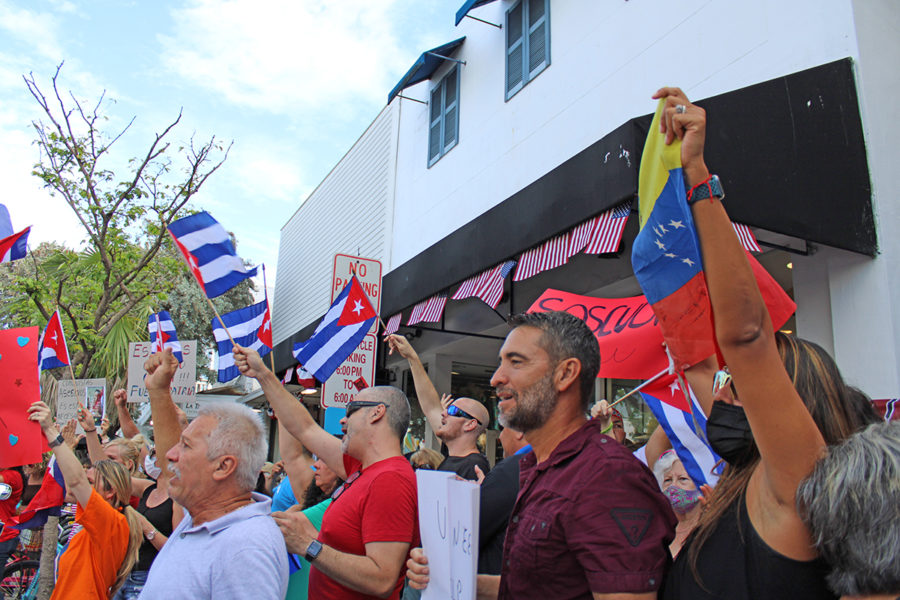
Desperate refugees
Since late May, some 21 Cubans have been declared dead or missing after capsizing near the Keys, trying to reach shore in two separate accidents; 21 of the passengers were plucked from the water and returned to Guantanamo. Although the Obama administration ended the “wet foot, dry foot” policy that would allow Cubans who reached U.S. soil to apply for U.S. citizenship, Cubans still try to make it here. Their hope is to arrive safely, and slip into South Florida unnoticed.
Since October, the Coast Guard has interdicted 554 Cubans and returned them to Cuba. The numbers are on the rise. That’s more than the number who were caught crossing the seas during the entire year of 2018 (259) and 2019 (313) and 10 times higher than those who crossed and were interdicted in 2020 (46). Unless the refugees require medical attention, they are kept aboard Coast Guard cutters and repatriated within days.
Yaimara Perez has been in the U.S. for more than five years and said she was desperate to leave Cuba. She said as soon as she arrived, she prioritized learning English to apply for citizenship, which she now has.
“Learning English was my best option in this county — I had to learn and learn and learn — so I could put in the papers to ask for my mom to immigrate here,” Perez said. “She is 66 years old.”
She continued, “We need to be free. We have to continue, we have to keep going. I don’t want this to just be about July 11. I want to see July 12 and July 13 and July 14 so that we can see change in Cuba.”
“As a humanitarian organization with a core mission of protecting lives at-sea, we echo the message of many U.S. leaders in support of the Cuban people exercising their fundamental right of freedom of expression and assembly, but also remind anyone considering a migrant voyage not to take to the sea. The transit is dangerous and unforgiving as nearly 20 lives were tragically lost in recent weeks as a result of these dangerous voyages.
The Coast Guard along with our local, state and federal partners are monitoring any activity that may indicate increases in unsafe and illegal maritime migration in the Florida straits, including unpermitted vessel departures from Florida to Cuba.”
— Rear Admiral Eric C. Jones, United States Coast Guard District 7




















